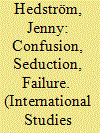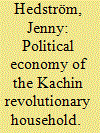|
|
|
Sort Order |
|
|
|
Items / Page
|
|
|
|
|
|
|
| Srl | Item |
| 1 |
ID:
170368


|
|
|
|
|
| Summary/Abstract |
This article highlights the influence of emotions, affective experiences, and rumors on the construction of knowledge within research on conflict and in international politics, as well as within the research process itself. Drawing from fieldwork undertaken in a conflict zone in Myanmar, it suggests that academic knowledge production practices are informed both by the (violent) context in which research is undertaken and by the demands of the discipline to produce a scientifically accepted piece of research. It proposes that attention to emotions may facilitate strong objectivity (Harding 1992) by foregrounding the relationship between research participants, researchers, and the broader research (institutional and immediate) contexts. It introduces the term “rumors-as-affect” as a means to discuss how affective atmospheres or events in the research environments inform research. Three interview situations are presented, in which different emotional reactions are highlighted, focusing on “confusion and guilt”; “seduction”; and finally, “failure and ignorance.” These events illustrate how, in recognizing the role emotions and affective atmospheres play in research on conflict and in international politics (cf. Crawford 2014; Hutchison and Bleiker 2014; Ross 2013), researchers may begin to do justice to our representations of what is encountered in the field and how knowledge is constructed within the discipline.
|
|
|
|
|
|
|
|
|
|
|
|
|
|
|
|
| 2 |
ID:
153250


|
|
|
|
|
| Summary/Abstract |
Applying a feminist political economy analysis of the Kachin military movement, this article will be mapping women's involvement in the armed uprising since the outbreak of the conflict in 1961, demonstrating the centrality of gender relations for the war. Using primary data, this article will show how the household provides essential support to the Kachin war effort in the shape of emotional, physical and material labour, thus underscoring the critical role played by women in maintaining the conflict. Examining the relationship between narratives of gendered insecurity in the community and notions of militarized duty, this article will argue that the Kachin armed forces have employed gendered notions of security and duty to legitimize and sustain the conflict. The importance of normative gender relations for providing labour and emotional and material support for the conflict will then be examined, showing how the household is situated as the nucleus of the armed revolution. The findings in this article thus reveal a need to take into account the relationship between the household and the armed conflict, arguing that the household is a site inseparably linked to nationalistic objectives, underpinning the economic and ideological structures of military movements. Interventions aiming at resolving the conflict in Kachin must therefore consider the importance of gender relations in upholding the political-economy infrastructure of the military movement.
|
|
|
|
|
|
|
|
|
|
|
|
|
|
|
|
|
|
|
|
|